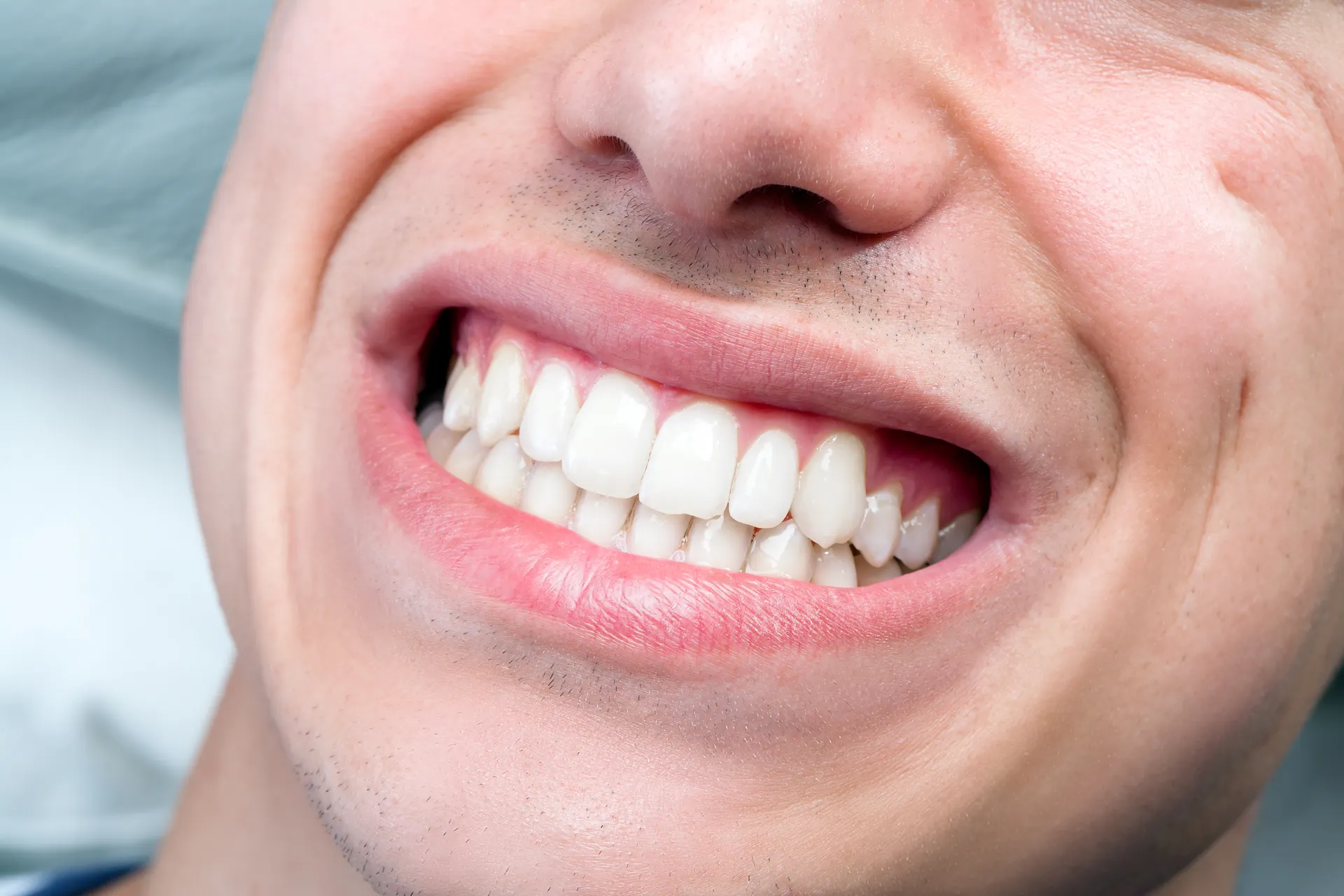If you grind your teeth, they may be suffering significant damage as the constant wear and excessive force can cause them to chip, crack, and even fall out.
Unfortunately, if you don’t control this habit, the same damage could affect any dental implants you receive to replace your lost teeth. This raises a crucial question: Can you get dental implants if you grind your teeth?
Teeth grinding, known as bruxism, involves forcefully moving your teeth against each other or clenching your top and bottom teeth together. Many people grind their teeth unconsciously while they sleep. Bruxism is a common condition, affecting about one-third of adults during the day and more than one in ten at night.
Let’s discuss how bruxism affects dental health and explore if you can still get dental implants.
Key Takeaways
- Dental implants are possible for those who grind their teeth, but proper management is essential.
- Bruxism can cause damage to both natural teeth and implants if not controlled.
- A thorough evaluation, including bone health and bruxism severity, is necessary before implants.
- Night guards, stress management, and regular dental check-ups help protect implants.
- With proper care, implants improve oral function, aesthetics, and stability, even for those with bruxism.
What Is Bruxism?
Bruxism is the medical term for teeth grinding or clenching. It occurs when you grind your teeth together or clench your jaw tightly. This condition can happen while you are awake or asleep. Many people grind their teeth unconsciously during sleep, which is known as sleep bruxism.
Causes of bruxism
Several factors can cause bruxism, including:
- Stress and anxiety
- Misaligned teeth or bite problems
- Sleep disorders, such as sleep apnea
- Certain medications
- Lifestyle factors like smoking, caffeine, or alcohol consumption
Symptoms of bruxism
Bruxism can cause various symptoms, including:
- Worn-down teeth
- Tooth sensitivity
- Jaw pain or stiffness
- Headaches, especially in the morning
- Earaches
- Disrupted sleep
- Pain in the face or neck
- Clicking or popping sounds in the jaw
If left untreated, bruxism can lead to serious dental problems. The constant grinding and clenching can wear down your teeth, making them more prone to decay and fractures. It can also cause damage to dental work, such as crowns and fillings. In severe cases, bruxism can lead to temporomandibular joint (TMJ) disorder, affecting the movement and function of your jaw.
Impacts of Bruxism on Dental Health
Bruxism can significantly affect dental health. Constant grinding and clenching put excessive pressure on teeth and jaws, leading to the following problems:
Tooth damage
The most immediate impact of bruxism is tooth damage. Grinding your teeth can wear down the enamel, making your teeth more vulnerable to cavities and decay. Over time, this wear and tear can lead to chipped, cracked, or broken teeth. In severe cases, the damage may be extensive enough to require tooth extraction.
Increased tooth sensitivity
As the enamel wears down, your teeth may become more sensitive to hot, cold, or sweet foods and drinks. This increased sensitivity can make eating and drinking uncomfortable.
Jaw pain and disorders
Bruxism can significantly strain jaw muscles and joints. This strain can lead to pain and stiffness in the jaw, making it difficult to open and close the mouth. In some cases, bruxism can lead to temporomandibular joint (TMJ) disorder. TMJ disorder affects the jaw’s movement and can cause chronic pain, clicking or popping sounds, and difficulty chewing.
Headaches and ear aches
The tension caused by bruxism can lead to frequent headaches, especially in the temples. Some people may also experience earaches due to the pressure on the jaw joints.
Overall Oral Health
Bruxism can negatively impact your overall oral health. The combination of tooth damage, increased sensitivity, jaw pain, and other symptoms can make maintaining good oral hygiene more challenging. This can increase the risk of developing other dental problems, such as gum disease.
It’s important to address bruxism to protect your dental health and overall well-being.
Can You Get Dental Implants If You Grind Your Teeth?
Many people with bruxism wonder if they can still get dental implants. The answer is yes, but there are important considerations to keep in mind.
Teeth grinding puts a lot of pressure on dental implants, just like it does on natural teeth. If not properly managed, this pressure can lead to the implant becoming loose.
Before getting dental implants, we will perform a thorough evaluation. This evaluation includes checking your bone density and gum health to ensure you have a strong foundation for the implants.
We will also assess the severity of your bruxism and determine how it might impact the success of your implants. This consultation will help our oral specialists map out a plan to ensure you enjoy a successful dental implant journey, manage bruxism, and proactively address any potential hindrances.
Precautions and Preparations for Dental Implants with Bruxism

If you grind your teeth and are considering dental implants, you should take the following precautions to ensure their success:
Address the root causes of bruxism
Identifying and addressing the underlying causes of your bruxism is vital. Common causes include stress, anxiety, and misaligned teeth. Managing stress through relaxation techniques, therapy, or lifestyle changes can help reduce teeth grinding. If misaligned teeth are the issue, orthodontic treatment may be necessary.
Use a night guard
Night guards are a common solution for protecting your teeth and dental implants from the effects of bruxism. These custom-fitted devices create a barrier between your upper and lower teeth, reducing the impact of grinding while you sleep.
Regular dental check-ups
Regular dental check-ups are essential for monitoring the condition of your implants and ensuring they remain in good shape. During these check-ups, we will check for signs of wear or damage caused by bruxism and make necessary adjustments to your treatment plan.
Proper oral hygiene
Maintaining good oral hygiene is vital for the success of dental implants. Brush and floss regularly to keep your teeth and gums healthy. Proper oral care helps prevent infections and other issues that could compromise your implants.
Taking these precautions and preparations can help ensure that your dental implants are successful, even if you grind your teeth.
Benefits of Dental Implants for Individuals with Bruxism
With proper management and precautions, implants can greatly improve your oral health and quality of life. Here are some of the benefits of dental implants:
Improved oral function
Dental implants restore the full function of your teeth. You can eat, speak, and chew more effectively, just as you would with natural teeth. This improvement can make daily activities more comfortable and enjoyable.
Enhanced aesthetics
Implants look and feel like natural teeth. They can improve your smile and boost your confidence. Unlike dentures, implants are fixed and do not shift or move, providing a more natural appearance.
Increased stability
For individuals with bruxism, dental implants offer more stability compared to other dental solutions. With the use of durable materials and proper care, implants can withstand the forces of grinding better than dentures or bridges.
Preservation of jawbone
Dental implants help preserve the jawbone. When you lose a tooth, the jawbone can deteriorate over time. Implants stimulate the bone, preventing bone loss and maintaining the structure of your face.
Prevention of further dental Issues
Implants can help prevent additional dental problems. By replacing missing teeth, implants keep other teeth from shifting out of place. They also help maintain proper bite alignment, reducing the risk of further damage from bruxism.
Comfort and convenience
Dental implants are comfortable and convenient. Unlike dentures, they do not require adhesives and do not require removal for cleaning. They become a permanent part of your mouth, making them easy to maintain.
Take the Next Step with Confidence
Choosing dental implants, even if you grind your teeth, is possible with the right care and expertise. At NuSet Dental Implant and Oral Surgery, we have the knowledge and advanced techniques to ensure your implants are successful and long-lasting.
Our comprehensive evaluation and personalized treatment plans address the unique needs of patients with bruxism.
Trust our experienced team to help you restore your smile and improve your oral health. Contact us today to schedule a consultation and take the next step towards a confident, healthy smile.
Frequently Asked Questions
Can teeth grinding or bruxism affect my eligibility for dental implants?
Yes, teeth grinding can affect your eligibility for dental implants. However, with proper management and evaluation, it is still possible to receive implants. When you come to us at NuSet Dental Implant and Oral Surgery, we will assess your bone density, gum health, and the severity of your bruxism to determine the best course of action.
Will teeth grinding damage my dental implants after they are placed?
Teeth grinding can damage dental implants by putting excessive pressure on them. Using a night guard and following your dentist’s advice can help protect your implants from this damage.
What precautions should I take to protect my dental implants if I grind my teeth?
To protect your dental implants, wear a custom-fitted night guard, maintain good oral hygiene, and attend regular dental check-ups. Managing stress and addressing any misalignment issues can also help reduce the impact of bruxism.
Are there any treatments for teeth grinding that can improve my implant success?
Yes, treatments such as using a night guard, stress management techniques, and orthodontic treatments can help manage bruxism. These treatments can improve the success of your dental implants by reducing the grinding forces on them.
Can dental implants help reduce my teeth-grinding habit?
While dental implants themselves do not reduce teeth grinding, our team will help manage this habit before getting your implants. What’s more, dental implants help restore proper alignment and function of teeth, which can improve overall oral health and reduce some triggers of bruxism. Managing the underlying causes of bruxism is still essential, which our oral specialists will help you with.





